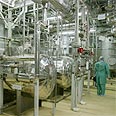
Syria gets Iranian boost
Western diplomat says Iran made commitment to Syria to provide Iranian technical assistance to facilitate Syria's chemical warfare program
With the release of the UN International Independent Investigation Commission interim report on 20 October into the assassination of former Lebanese Prime Minister Rafik Hariri increasing international pressure on Syria, a diplomatic source has said that Damascus is nevertheless pursuing what they describe as "an innovative chemical warfare (CW) program in co-operation with Iran", Jane's Defence Weekly newspaper reported Monday.
The essence of this co-operation, the source told the newspaper, "is Tehran's contractual commitment, made to Syria a few months ago, to provide Iranian CW technical assistance to facilitate Syria's CW program".
Utilizing this assistance, they said, Syria hopes to reach an independent production capability of precursors for producing CW agents, which it has so far been unable to achieve.
According to the source, Iran will assist Syria in the planning, establishment and pilot operation of about four or five facilities throughout Syria for the production of precursors for VX and Sarin nerve agents and mustard blister agent.
"This project is unprecedented and millions of US dollars have been allocated to implement it," the source said.
"The project includes building major facilities, including advanced equipment to produce tens to hundreds of tons of CW precursors per year that are sufficient for CW industrial manufacturing pilot production," the source added.
Iran bomb could fuel Middle East arms race
If Iran develops nuclear weapons it could spark a regional arms race because Turkey, Saudi Arabia and Egypt would consider getting atomic bombs, a leading think tank said on Tuesday.
John Chapman, director of the London-based International Institute for Strategic Studies, told a news conference that it was unlikely that diplomatic pressure from the European Union would stop Iran developing its nuclear enrichment program.
He said if Iran ended up with a confirmed, deployed nuclear capability, Turkey, Egypt and Saudi Arabia would "reconsider their positions".
Western nations suspect Iran is developing atomic weapons under cover of a civilian program, although Tehran insists it is intended only for peaceful electricity generation.
The United States and European Union have put diplomatic pressure on Iran to halt its program and are also trying to persuade the International Atomic Energy Agency (IAEA) to refer Iran to the United Nations for possible sanctions.
The IISS said in its annual handbook on global military might, "The Military Balance", released on Tuesday that it was unlikely the EU diplomacy would yield results.
However, Chapman said a nuclear Iran was still a long way off so there was time to focus on diplomatic activity.










